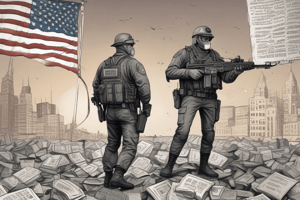Podcast
Questions and Answers
What does the 4th Amendment protect against?
What does the 4th Amendment protect against?
- Double Jeopardy
- Cruel and Unusual Punishments
- Self-Incrimination
- Unreasonable Search and Seizure (correct)
What was the significance of Mapp v. Ohio?
What was the significance of Mapp v. Ohio?
Evidence illegally gathered by the police may not be used in a criminal trial.
What does California vs Acevedo establish regarding search warrants?
What does California vs Acevedo establish regarding search warrants?
Warrants are not needed to search a car that has been lawfully stopped.
What does Terry vs. Ohio allow police to do?
What does Terry vs. Ohio allow police to do?
What is Reasonable Articulable Suspicion?
What is Reasonable Articulable Suspicion?
What is meant by 'Stop and Frisk'?
What is meant by 'Stop and Frisk'?
What does Florida vs. Bostick allow?
What does Florida vs. Bostick allow?
What are consent searches?
What are consent searches?
What are Pretext Stops?
What are Pretext Stops?
What are Civil Liberties?
What are Civil Liberties?
In 1986, the DEA instituted '__________,' a highway drug interdiction program.
In 1986, the DEA instituted '__________,' a highway drug interdiction program.
What is the role of the Drug Enforcement Administration (DEA)?
What is the role of the Drug Enforcement Administration (DEA)?
What does the militarization of local law enforcement refer to?
What does the militarization of local law enforcement refer to?
What do Drug Forfeiture Laws involve?
What do Drug Forfeiture Laws involve?
What does Gideon v. Wainwright guarantee?
What does Gideon v. Wainwright guarantee?
What is plea bargaining?
What is plea bargaining?
What does overcharging for crimes by prosecutors refer to?
What does overcharging for crimes by prosecutors refer to?
What did Lockyer v. Andrade rule?
What did Lockyer v. Andrade rule?
What does the 8th Amendment protect against?
What does the 8th Amendment protect against?
Who is considered a felon?
Who is considered a felon?
Flashcards
4th Amendment
4th Amendment
Protects against unreasonable government searches and seizures.
Mapp v. Ohio
Mapp v. Ohio
Illegally obtained evidence is inadmissible in criminal trials.
California vs Acevedo
California vs Acevedo
Police can search a stopped vehicle without a warrant if probable cause exists.
Terry vs. Ohio
Terry vs. Ohio
Signup and view all the flashcards
Reasonable Articulable Suspicion
Reasonable Articulable Suspicion
Signup and view all the flashcards
Stop and Frisk
Stop and Frisk
Signup and view all the flashcards
Florida vs. Bostick
Florida vs. Bostick
Signup and view all the flashcards
Consent Searches
Consent Searches
Signup and view all the flashcards
Pretext Stops
Pretext Stops
Signup and view all the flashcards
Civil Liberties
Civil Liberties
Signup and view all the flashcards
Operation Pipeline
Operation Pipeline
Signup and view all the flashcards
Drug Enforcement Administration (DEA)
Drug Enforcement Administration (DEA)
Signup and view all the flashcards
Militarization of Local Law Enforcement
Militarization of Local Law Enforcement
Signup and view all the flashcards
Drug Forfeiture Laws
Drug Forfeiture Laws
Signup and view all the flashcards
Gideon v. Wainwright
Gideon v. Wainwright
Signup and view all the flashcards
Plea Bargaining
Plea Bargaining
Signup and view all the flashcards
Overcharging by Prosecutors
Overcharging by Prosecutors
Signup and view all the flashcards
Lockyer v. Andrade
Lockyer v. Andrade
Signup and view all the flashcards
8th Amendment
8th Amendment
Signup and view all the flashcards
Felon
Felon
Signup and view all the flashcards
Study Notes
4th Amendment
- Protects individuals from unreasonable searches and seizures by the government.
Mapp v. Ohio
- Established that illegally obtained evidence cannot be used in criminal trials, reinforcing the exclusionary rule.
California vs Acevedo
- Determined that police can search a lawfully stopped vehicle without a warrant if they have probable cause.
Terry vs. Ohio
- Permits police to stop and search individuals based on reasonable suspicion of criminal activity, establishing the basis for "stop and frisk."
Reasonable Articulable Suspicion
- A legal standard requiring a specific level of proof for conducting brief investigative detentions, often linked to Terry stops.
Stop and Frisk
- A procedure where police pat down or search a person's outer clothing if they suspect criminal behavior.
Florida vs. Bostick
- Affirmed that random consent searches on public transportation are permissible under specific conditions.
Consent Searches
- Involves an individual agreeing to allow law enforcement to search their person or belongings voluntarily.
Pretext Stops
- Refers to traffic stops made for minor infractions while intending to investigate more serious offenses.
Civil Liberties
- Fundamental rights enshrined in the Constitution protecting citizens from government overreach.
Operation Pipeline
- A 1986 DEA initiative training local police in using pretext stops for drug interdiction efforts on highways.
Drug Enforcement Administration (DEA)
- A federal agency founded in 1973 aimed at combating illegal drugs both domestically and internationally.
Militarization of Local Law Enforcement
- The increasing use of military-grade equipment and tactics by local police forces.
Drug Forfeiture Laws
- Legal provisions allowing authorities to seize assets connected to drug offenses.
Gideon v. Wainwright
- A ruling that guarantees the right to a government-appointed attorney for defendants unable to afford one.
Plea Bargaining
- An agreement where defendants plead guilty to lesser charges in exchange for reduced sentences or penalties.
Overcharging by Prosecutors
- A strategy where prosecutors may charge defendants with more severe crimes than can be proven, impacting plea negotiations.
Lockyer v. Andrade
- Upheld the constitutionality of California's three strikes law, allowing for harsher sentences after multiple felony convictions.
8th Amendment
- Prohibits cruel and unusual punishments, ensuring fair treatment within the judicial system.
Felon
- An individual who has been convicted of a serious crime, often carrying significant legal and social implications.
Studying That Suits You
Use AI to generate personalized quizzes and flashcards to suit your learning preferences.




